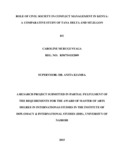| dc.description.abstract | Over the years, there has been a growing interest in the concept of civil society and its contribution to peace. There is no commonly agreed definition of what and who this sector actually includes however. According to the London School of Economics Centre for Civil Society, civil society ‗refers to the arena of uncoerced collective actions around shared interests, purposes and values. It commonly embraces a diversity of spaces, actors and institutional forms, varying in their degree of formality, autonomy and power. According to other experts, civil society includes all forms of voluntary activities and participation in different sectors of public life. For others still, the role of civil society is to interact with the political sphere, influence it and increase its responsiveness.
Beyond promoting democratic governance, civil society can also play a potentially important role in conflict resolution. Conflicts tend to arise over non-negotiable disputes over the satisfaction of fundamental basic needs. Therefore conflict resolution means going beyond negotiating interests in order to meet all sides‘ basic needs. Civil society actors can be instrumental in this respect. CSOs have access to the parties involved in conflict and the ability to bring parties to dialogue. They also induce local populations to get involved in long-term reconciliation efforts. By working directly with local populations on the ground, civil society is also able to assess the situation more effectively than top levels of governance or external actors.
Civil society involvement in conflict and peace gained greater prominence since the Cold War, not least in view of the mushrooming of conflicts in this period. Peace efforts may be divided according to the different stages of conflict, i.e. efforts and activities aimed at conflict prevention, peacemaking, peacekeeping and post settlement reconciliation. | en_US |



